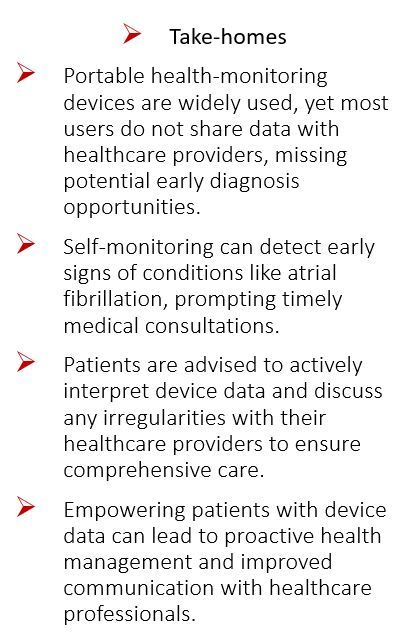
- Clinical Technology
- Adult Immunization
- Hepatology
- Pediatric Immunization
- Screening
- Psychiatry
- Allergy
- Women's Health
- Cardiology
- Pediatrics
- Dermatology
- Endocrinology
- Pain Management
- Gastroenterology
- Infectious Disease
- Obesity Medicine
- Rheumatology
- Nephrology
- Neurology
- Pulmonology
Most People Who Monitor Health with Wearable Devices Don't Share Data with Clinicians
Only 25% of people who self-monitor health use the data to inform their physicians.
Just one-quarter of individuals who self-monitor their heart health discuss the data with their physicians, according to a new survey by researchers at Ohio State University Wexner Medical Center; a curious finding given additional survey results that show nearly two-thirds of Americans regularly use devices to keep track of heart function, including:
- 32% who use smartwatches
- 31% who use portable blood pressure machines
- 19% who use fitness apps
- 13% who use wearable fitness/movement tracker devices
The survey included 1008 US adults and was conducted by telephone and internet between December 18-18, 2024.
“These self-monitoring devices are really helpful to patients and their health care providers because they can potentially catch things early,” Laxmi Mehta, MD, director of preventive cardiology and women's cardiovascular health at The Ohio State University Wexner Medical Center, said in a university release. “For example, if patients are monitoring their blood pressure at home and notice it’s been going up over time, they may want to discuss it with their doctor sooner rather than waiting for their annual visit. Or they may capture some irregular heart rhythms on their devices, like atrial fibrillation, much sooner than would be diagnosed at the doctor’s office.”
Despite the 25% who tend not to share their information, Mehta emphasized that many patients she sees increasingly seek guidance on how to interpret and act on the data collected by the self-monitoring devices.

A patient’s perspective
After several falls, Sue VanWassenhove, 78, of Upper Arlington, Ohio, was gifted a smartwatch by her children to help monitor her health. VanWasserhove has sleep apnea and needs to pay close attention to her heart rate and breathing. Recently the smartwatch telegraphed a pattern of declining heart rate, which prompted her to make an appointment with Mehta.
Mehta showed VanWassherhove how to use the electrocardiogram (EKG) feature on the smartwatch and how to transmit the results directly to the doctor using her electronic medical chart.
“Having a smartwatch is very empowering because I’m not being passive with my health care. I have some heart issues that need to be monitored, and it’s important for me to talk to my cardiologist or primary care doctor about any health issues that show up on my watch,” VanWassenhove said.
Mehta advises patients to stay alert to changes in their heart rate or rhythm, which could signal underlying conditions, including infection, dehydration, anxiety or thyroid disorders. “When someone’s heart rate or rhythm seems different than usual, it’s best for them to speak with their doctor,” Mehta said.
Source: Survey: Most Americans use a portable device to monitor their heart, but they’re missing a lifesaving step. News release. The Ohio State Wexner University Wexner Medical Center. Accessed January 22, 2025. https://osuwmc.multimedia-newsroom.com/index.php/2025/01/22/survey-while-most-americans-use-a-device-to-monitor-their-heart-few-are-sharing-that-data-with-their-doctor/
2 Commerce Drive
Cranbury, NJ 08512
All rights reserved.